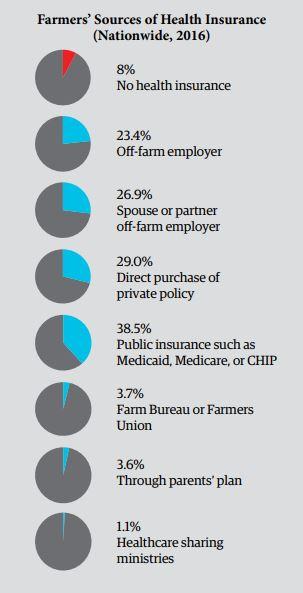

Access to physical and mental health care is directly connected to farm viability and quality of life. Health care costs and the cost of living have far outpaced gains in farm-based income (and other forms of income) in Vermont. This affects farmers, farmworkers, and consumers, with ramifications from food access to farm operations. Farm families and farmworkers have difficulties accessing health insurance and health care due to the high cost of insurance (including deductibles, copays, and policy costs), lack of (or inadequate) insurance coverage, and limited access to rural providers. Lack of access to affordable health care can impact farm productivity, hiring of farmworkers, farm risk-management strategies, farm transition, land access, and the need for off-farm income. In a national study, a majority of farmers reported that they couldn’t withstand a major health crisis without going into debt or selling off their farm assets.
Vermont farmers report the cost of health insurance as a major barrier to farming full-time, farming long-term, or hiring non-family employees. Long, laborious work hours can put farmers and farmworkers at increased risk of poor health, fatigue, and injury. Nationally, almost 60% of farm households include an individual with a pre-existing health condition, and one third report at least one family member with health issues that make farming difficult. Vermont farmers, whose average age is 57.3, will need more health and elder care as they age, and Medicare and limited retirement savings may not provide sufficient coverage.
Nationally, 41% of farmers access health insurance through off-farm work, and half of these cite insurance as the main reason for off-farm employment. Off-farm employment decreases the time and energy available for farming, and isn’t an option for full-time farmworkers. Farmers and farmworkers relying on Medicaid must ensure their income remains low enough to continue to qualify for benefits. Underinsurance is an issue among farm families, as is medical debt: 20% of farmers nationally are reported to have outstanding debt from medical bills. Premiums for farmers tend to be higher than for the general population due to the risks of agricultural work, an older population, and fewer rural health insurers.
Of the approximately 1,500 Latinx employees on Vermont farms, 99% are ineligible for health insurance. The 450-500 farmworkers in Vermont on H-2A visas are not eligible for Medicaid and face numerous barriers applying for subsidized insurance on Vermont Health Connect (VHC). Highturnover in VHC employees and inconsistent training has led to confusion and lack of trust on the part of individuals seeking health insurance and health care support.
